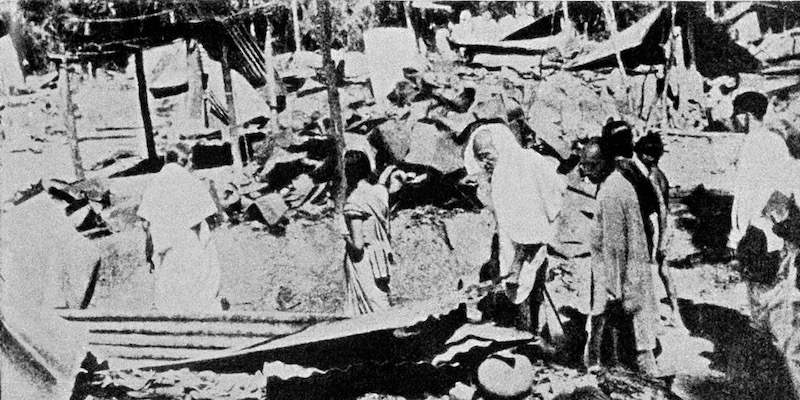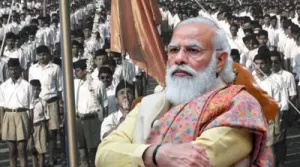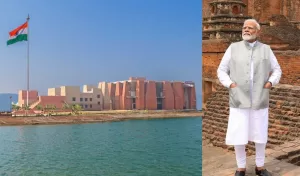On Independence Day eve, Prime Minister Narendra Modi declared that henceforth August 14 would commemorate “Partition horrors”. Many genocides are commemorated worldwide on symbolic days but in most the intention is to heal, not to keep the scars festering. Judging from the prime minister’s record as chief minister of Gujarat and from the of the organisation he comes from, the Rashtriya Swayamsevak Sangh, his intentions are questionable. As chief minister of Gujarat in 2002, he had been, to say the least, benevolent towards what he brushed off as “spontaneous reaction” to the horrifying incident at Godhra. Violence thrived unchecked on his watch.
Yes, Partition and the unimaginable crimes that accompanied it must never be forgotten, but the scars they left behind must be allowed to fade, not fester. Those horrors are a matter of shame for the entire subcontinent – India, Pakistan and what is now Bangladesh. They are a blot on the syncretic heritage of our region, a shame shared by Muslims and Hindus alike.
But it must also not be forgotten that in the midst of the horrors there was hope, in the midst of devilry and villainy there were heroic deeds of humanity too. The villainous deeds far outweighed the heroic and humanitarian ones but both, the villainous and heroic deeds, took place amongst both religious groups involved. While commemorating Partition’s horrors it must not be forgotten that along with Hindus, Muslims too were victims of savagery and that, as amongst Hindus, there were heroes amongst Muslims too.
The start
Violence erupted in August 1946, initiated by Muhammad Ali Jinnah’s Muslim League’s call of ‘Direct Action Day’ to be observed on August 16, 1946, as the beginning of a no-holds-barred battle for Pakistan. What must be remembered is that the violence was not in all areas where Muslims were in a majority, but occurred in the provinces where the Muslim League was in power. They were more political than communal.
Initially, in Calcutta, Muslim League thugs massacred Hindus. Then, extremist Hindu organisations massacred Muslims. In both instances, humanity was killed but we like to keep scores so everything has to be in terms of ‘us’ and ‘them’. This sparked off a chain of violence. The killings of Muslims in Calcutta was avenged in East Bengal, particularly in the remote Muslim majority districts of Noakhali and Tiperrah. Hindus were butchered, forced to convert under threat of death and girls and women were raped, abducted and trafficked. The same was earlier done in Calcutta by both communities and has happened subsequently wherever hate violence has erupted, preceding and during Partition and in independent India.
The violence in Noakhali was avenged by pogroms against Muslims in Bihar. Hate and savagery had been ignited and was consuming India even before it was independent. All this while the west, Punjab and later Sindh too, were consumed by an inferno of hate. Even in Jammu province of the then Riyasat-e-Kashmir, Muslims were targeted. As for the Pakistani kabaliya invaders, they were equally brutal with both Hindus and Muslims.
The violence continued unabated during the transfer of power. Sanity was established only in 1948 by the shock of the murder of Bapu, Mahatma Gandhi.
Beacons of hope
Amidst the carnage, there were great acts of heroism and humanity. Today, when the prime minister decides to commemorate the horrors, he should grieve for all those murdered irrespective of their religion. We need to especially commemorate the heroes who saved others, putting their own lives in danger. They represent the India we are losing today.
Amidst the insanity, there were heroic instances of Muslims risking their lives to save their Hindu neighbours and Hindus doing the same for Muslims.
In Noakhali, Muslims and Hindus of Hasnabad village vowed to not allow the peace to be shattered. When the Muslims heard that rioters were meeting at a secluded badi to plan an attack on Hindu homes, they led the police to the spot and the would-be murderers were arrested and Hindus saved.
At Bhatialpur, a lone Muslim man stood between a Hindu doctor and a mob, protecting him at the risk of his own life. He bravely bore a blow from a dao, a long curved machete, intended for the doctor. That doctor, Chandrashekhar Bhowmik, later joined Bapu’s peace mission and served as a translator for Pyarelal Nayyar, Gandhi’s secretary and biographer. His Muslim saviour later also saved Nayyar, who was waylaid one night by a gang of Muslim cut-throats while he was rushing to defuse a critical situation in a village covered by the peace camp he had established.
Many women were rescued from mobs by their Muslim neighbours, shielded and later returned safe to their families or to the authorities. Two girls, who were rescued by their Muslim neighbours, recounted their story to Gandhi. They were all praise for their Muslim rescuers who had given them refuge, braving insults and threats from the mobs. Their benefactors even ensured that the girls lived by the strict Hindu tradition, and arranged for them to be able to cook their own food. Sadly, once the situation normalised, their relatives refused to accept them back saying they had been polluted by their contact with Muslims. Finally, the girls were brought to the Gandhi Peace Mission camp, and lived and worked there.
Heroism all around
Ghulam Sarwar was the leader of the carnage in Noakhali and Tipperrah. In Bhatialpur, his killer gang had a list of five Hindus whose heads Sarwar had demanded. The local Muslims refused to oblige. When the standoff was reported to Sarwar, he demanded that five Muslims pledge their lives as guarantee of the “good conduct” of the Hindus. Accordingly, five local Muslims stepped up.
A Muslim in Karatkhil refused to join the murderous mob that was killing Hindus. He was penalised – the killers slaughtered his cattle and feasted on them. Sarwar’s brother, a maulvi, publicly condemned his brother’s savagery. At the peak of the riots, when the Hindus living in his village came to him for advice as to whether they should convert to escape death, he advised them not to. He said they should not convert unless Islam appealed to them on its merits and they felt an inner urge to accept it. He also assured them that as long as he was alive they would be safe; he remained true to his word.
In Razakpur under the Begumganj police jurisdiction, a Hindu advocate popular amongst both communities was marked for execution. The local Muslim Member of the Legislative Assembly, who was also a Pleader in court, secretly warned him about the threat. A local maulvi sent him away in his own boat with a trusted boatman to the railhead of Chandpur. He personally saw off the advocate at the railway station, tears streaming down his face. When a few months later news of the maulvi’s death reached the refugee, it was his turn to mourn.
There were many others who performed significant acts of heroism. In those days, abducted girls and women were transported from riot-affected areas to other parts of India, especially its cities, for ‘trade’. Several women, Hindu and Muslim, worked tirelessly, fearlessly patrolling trains and manning checkposts on roads and highways to rescue women and children from traffickers. Prabhavati Behen worked tirelessly in Bengal and Bihar; Aruna Asaf Ali and others rescued many on both sides of the divided subcontinent. They rescued them all without asking them their religion. Rameshwari Nehru was tireless – along with Mridula Sarabhai, Kamlaben Patel and other women in Punjab, on both sides of the new border, even after Independence – to find, rescue and repatriate abducted women and children. Then, too, the victims’ religion was not of concern to them; what mattered was the rectification of a crime, a sin.
Mahtama Gandhi’s peace mission in Noakhali attracted help from all over India. A group of Ahmadiyas, a persecuted sect of Muslims from Punjab, sent Rs 5,000 as relief for their “brothers” in Noakhali. In a letter, the secretary of the Ahmadiya organisation wrote: “I have to mention in this connection that Islam, as a principle, stands for the assistance and emancipation of all the distressed and downtrodden, irrespective of class or creed and we consider it our sacred duty to render every possible help and cooperation for the relief of the distressed, whosoever they may be.”
Another cheque for Rs 650, along with 200 pairs of conchshell bangles and a pound of vermillion sindoor, was received for distribution among Hindu women, victims of the riots. The donors were 11 Muslims and a European from Assam.
When we commemorate the horrors of Partition, we must pray to atone for the crime against humanity that was committed at that time, we must pray for a healing with the objective of reconciliation, not to perpetuate hate.
The courage of Bibi Amtus Salam
When Bapu reached Sirandi during his solo peace pilgrimage, Bibi Amtus Salam was working to establish peace there and reconcile the two communities. She had been on a fast for 25 days against some local Muslims.
Bibi was a strict Muslim who practised all religious duties with extreme discipline. Since childhood, she held Hindu-Muslim unity as her life’s supreme goal. During the Partition riots, she rushed to many troublespots in Delhi, Calcutta and Dacca (as Dhaka was known then) and intervened to bring the situation under control, often risking her own life to save many families, women and children irrespective of their religion. What led to Bibi Amtus Salam going on a fast was an incident at Sirandi. There was an old Kali temple in the village where Hindus would offer sacrifice. There were three sacred swords, or khadags, in the temple used for the sacrifices. The ritual was that the khadags would be sharpened and blessed before the ritual.
Before the riots began, the khadags had been prepared for the festival of the goddess. This practice was exploited and a rumour was floated that the Hindus were planning to attack Muslims. The swords, the rumour went, were to be used in the attack.
When riots erupted, along with Hindus the temple was also attacked and partly demolished, and the priests were murdered. The three sacred khadags were carried away by the looters. After the Gandhi Peace Mission managed to establish peace, the one sore point that kept the distrust and enmity alive were the three missing khadags.
Bibi too was concerned. She realised that the khadags had become a symbol of the persecution of Hindus and their return would help establish confidence and maybe even bring about normalisation. She took it upon herself to retrieve the khadags. She met community leaders, both Hindu and Muslim. She realised that Muslims involved in the carnage were reluctant to return the khadags because for them they were tools to subjugate Hindus. Finally, after trying her best, Bibi utilised the weapon of satyagraha – fasting. She declared that she would shun food and water until all three khadags were returned. This resulted in two of the khadags being returned but Bibi insisted on all three. Her health was deteriorating; she was suffering from fever and a racking cough, but her resolve was unwavering.
When Bapu was informed about Bibi’s unflinching stance, he wrote to her: “It smacks of impatience. You want to take the law into your own hands and dictate terms to Lord God Himself, insisting on submitting to the agony of a prolonged fast.” Bibi relented and decided to consume a limited amount of water, but she insisted that her fast would continue till all three khadags were returned to the temple. The local Muslims remained unmoved and the police declared their helplessness. They even accused Bibi of “obstinacy” and “wilfulness” in making a major issue out of, what they called, a trifle. They complained to Bapu, who told them that they should do what their duty demanded and nothing more: “If she is obstinate and dies, let her die and die disgraced. If she is right and the right is not vindicated in her lifetime, death will be a fit atonement.”
And so her fast continued. After 12 days, as her life ebbed away, Bibi was cheerful and at peace. Non-stop recitations of shlokas from the Gita and ayats from the Koran comforted her.
Bapu arrived at Sirandi on the 25th day of her fast. A large gathering of Muslims met him, pleading with him to get Bibi Amtus Salam to relent. They told him that they had tried their best to recover the third khadag but had failed.
Bapu reflected on the philosophy of fasting as a weapon of satyagraha. The two crucial phases in fasting were its beginning and end. A hasty recourse to fasting was sinful, so was its prolongation due to obstinacy, pride or intoxication due to success after its conditions had been essentially fulfilled. But equally sinful was its premature termination out of weakness or the will to believe that its terms had been fulfilled, when in fact they were not.
Finally, he proposed a peace pledge which he would draft and all the gathered Muslims would have to sign and promise to abide by. Bapu warned them that any breach of the promise would lead to him embarking on a fast unto death. The declaration was signed by 11 leading Muslims from the surrounding four villages. The 12th member, who had first spoken on behalf of the Muslim assembly, did not sign. He had gone away to “attend a meeting” miles away. There were several reports that he was responsible for the forcible conversion of many Hindus during the disturbances. Some Muslims argued that since the village he hailed from was not part of the area which fell under the jurisdiction of the pledge, his signature was not necessary. But, Bapu insisted on it. If the reports against him were true, it was necessary that he show repentance and give a guarantee for the future. His signature was obtained the next morning.
The Muslims argued that cases of petty thefts were common and not communal in nature. Would Bapu go on a fast if thefts occurred and the signatories were unable to prevent them even though they were not communal? Bapu explained that he would give the signatories adequate opportunity to vindicate their position before he took any step. At the same time, he warned, there was enough reason to believe that much of what had occurred during the disturbances and which continued to happen under the guise of petty theft was definitely communal in character. If the thugs could do what they liked with the Hindu minority without a serious effort being made by the Muslims to restrain them, it meant that the thugs enjoyed the community’s support. It was important, therefore, that Muslims prevent all such cases of theft, persecution and terrorism and see to it that full justice was done.
Bapu then explained the significance of the pledge to Bibi Amtus Salam and after the recital of Al-Fateha, she broke her 26-day fast by taking three ounces of diluted orange juice from a glass held to her lips by Bapu.
The third khadag was never found but the threats, communal harassment and thefts stopped. The malady was too deep-rooted to be uprooted by anything but an all-purifying fast. Bibi Amtus Salam’s fast was the catalyst of change. Things improved steadily at Sirandi after that. The fast blew away the stench of death and destruction that had shrouded the area and in a small way became the start of the journey of the restoration of faith, dependence and a mutually beneficial relationship between the two communities. This was the courage and conviction of Bibi Amtus Salam.
These are the acts worth commemorating. In today’s vitiated atmosphere, these are the stories we need to be reminded of. We must not forget the horrors, but the ones of hope must also be remembered. They are the silver lining on the dark clouds of hate.
[Tushar Gandhi, great grandson of the Mahatma, is an activist, author and president of the Mahatma Gandhi Foundation. Courtesy: All Indians Matter, a website created by Ashraf Engineer, a senior journalist.]




